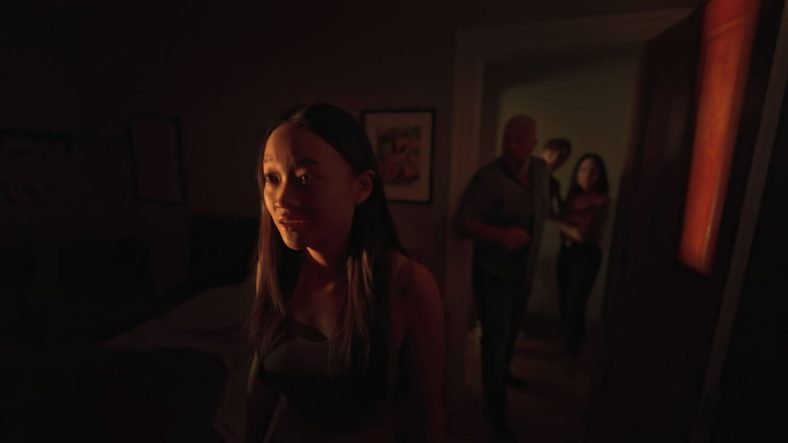‘Presence’ Sundance 2024 Review: A Technically Stunning Haunted House

Steven Soderbergh, a pioneer of the independent film movement, is one of the most innovative filmmakers of the modern era. No two films of his are alike beyond their almost primordial interest in pushing the boundaries of what film is and can be narratively, structurally, and from a perspective of pure craftsmanship. His latest Sundance premiere, 35 years after he first dazzled audiences with Sex, Lies, and Videotape, is Presence, a subversive haunted house chamber piece that, while a technical marvel, is at times a little too slight to reach classic status.
While it was never addressed in the post-screening Q&A with Soderbergh, writer David Koepp (Jurassic Park, Stir of Echoes, Panic Room), and the cast, I couldn’t help but think of Soderbergh’s 2018 genre feature Unsane as Presence revealed its hand during its 85-minute runtime. Unsane, like Presence, took a conventional and commercial genre framework and iterated technically, not narratively. There, the thrust was a deep POV shared with protagonist Sawyer Valentini (Claire Foy), accomplished via filming exclusively with an iPhone 7 Plus, as her life unfurled in standard woman-in-peril fashion. Sawyer has a stalker, though no one believes her, resulting in her involuntary commitment with the man behind it all.
Also Read: ‘Love Lies Bleeding’ Sundance 2024 Review: Romance and Gore
The results were successful, and some Dread contributors at the time even listed it in their year-end best lists. If Presence secures distribution and releases this year, I could see it managing the same. While its experimental form limits its commercial aspirations, the dizzying technical accomplishments and assured, steadied hand of Soderbergh imbue Presence with an inimitable, almost oppressive quality that flips the haunted house script on its head.
Presence is told primarily from the titular presence’s point-of-view, a masterclass in choreography and staging that, within mere moments, acclimates the audience to their voyeuristic, peripheral perspective. Soderbergh’s camera whips around a gorgeous suburban home as its inhabitants, grappling with trauma of their own (more on that later), unravel amidst a gnawing, growing awareness that they’re not alone.
Koepp and Soderbergh both remarked that the simplicity was appealing. In using a centuries-old formula—family, haunted house—they try to suggest trauma as a gateway for the supernatural, a means with which to identify the blind spots we have in our own families. If we’re blind to a ghostly haunting, how can we know what’s going on with our children or spouses?
It’s a compelling template, even if the trauma gateway isn’t quite as transgressive as Presence wants you to believe. Trauma-informed horror isn’t new, and paradoxically, for all the modern riffs on Steadicam use and jarring sound design, the gauzy, traumatic narrative overlay dates Presence, at times suggesting it was released in 2014, not 2024. Maybe that timelessness is the point, even though it’s an unfortunate pox on an astounding feat of filmmaking.
Also Read: ‘Your Monster’ Sundance 2024 Review: A Monstrously Good Time
The committed cast consistently and considerably elevates the material at every point. Presence is never boring, and the limited perspective, even as it shifts from horror to domestic melodrama, engages. Lucy Liu resists archetypes as mother Rebekah, a cold, detached maternal figure (and the film’s standout) that never devolves into cliché. Father Chris (Chris Sullivan) might be one of the greatest horror dads of all time. Adolescents Chloe (Callina Liang) and Tyler (Eddy Maday) are appropriately haunted and combative, squaring off as the presence twists itself into their lives more and more.
Contextually, Presence grapples with sexual assault, addiction, and grief as the film orbits around the death of Chloe’s best friend Nadia. It’s slight yet effective, suggestive enough to inform what the presence might be without eroding the stunning simplicity with an excess of exposition.
And it’s that simplicity that will make or break Presence. In the quiet, muted spaces, Presence is a chilling foray into modern-day hauntings. Those unable to acclimate to the clearly delineated boundaries might find themselves too detached for the full efficacy to land. Either way, Presence is a remarkable accomplishment, one liable to leave audiences with the sinking feeling they’re tethered to a presence all their own as the credits roll.
-
Presence
Summary
Steven Soderbergh’s latest is a remarkable technical achievement that flips the haunted house subgenre on its head.
Categorized:Reviews

